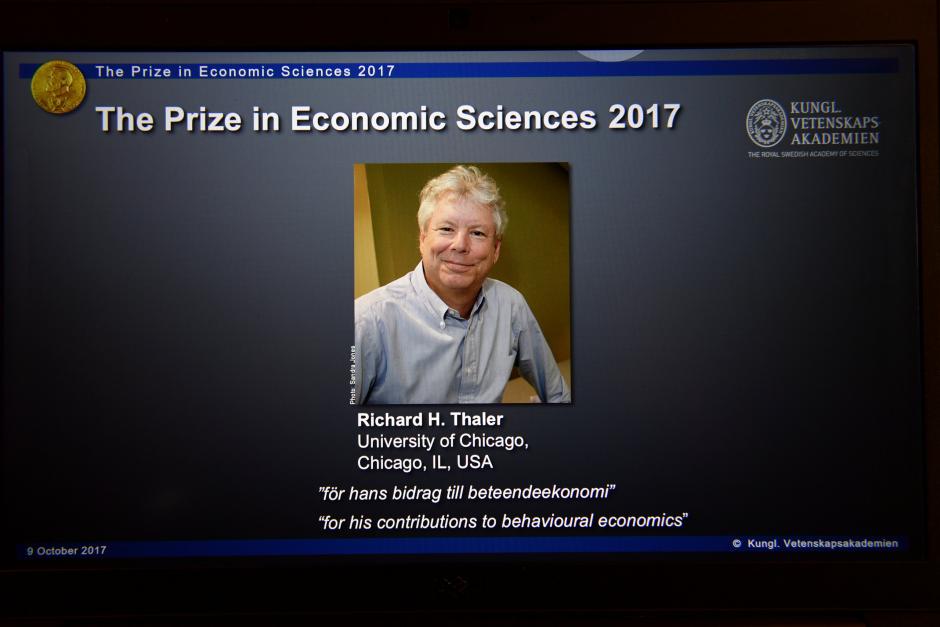72-year-old Richard Thaler, one of the founding fathers of the “nudge” theory of behavioral economics, has bagged this year’s Nobel Prize for Economics. Along with it comes a handsome prize of £840,000, or 9 million krona.
The American academic and co-author of a bestselling book based on the nudge theory has been widely read and embraced by politicians around the world. The theory essentially proposes that consumer behavior can be influenced by using the right prompts. For example, UK Prime Minister Theresa May’s “opt out” policy for organ donation presupposes that everyone wants to donate their organs after their passing, unless they choose to opt out of it.
There are several use cases where the nudge theory has been effectively deployed, such as by the Department of Health in regards to e-cigarettes. Thaler is regarded as a pioneer in “nudging”, which belongs to the field of behavioral economics and provides “a more realistic analysis of how people think and behave when making economic decisions.”
Thaler is currently a professor at the University of Chicago, and has previously put forward the theory that Brexit was, in fact, behavioral economics at play. According to him, voters in Britain were influenced by the opinions of mainstream media and the elite, which led them to make an irrational choice.
Thaler’s bestselling book, published in 2008 with Prof. Cass Sunstein as co-author, is called Nudge: Improving Decisions about Health, Wealth, and Happiness
The Nudge theory, according to Thaler, was even used by Ponzi scheme master Bernie Madoff. Thaler even went so far as to say that Madoff could have written a similar book on how to influence people for personal gain.
Other notable Nobel laureates this year were ICAN (International Campaign to Abolish Nuclear Weapons) for the Peace Prize, Kazuo Ishiguro for Literature, and Jefferey C. Hall, Michael Rosbash and Michael W. Young for Physiology/Medicine.
About the Nobel Prize
Alfred Nobel instituted the Nobel Prize in his last will and testament in 1895, but it was only in 1901, after much controversy, that the first Nobel Prize was awarded. Here’s an excerpt from his third and last will referring to the prize in detail:
“The whole of my remaining realizable estate shall be dealt with in the following way: the capital, invested in safe securities by my executors, shall constitute a fund, the interest on which shall be annually distributed in the form of prizes to those who, during the preceding year, shall have conferred the greatest benefit to mankind. The said interest shall be divided into five equal parts, which shall be apportioned as follows: one part to the person who shall have made the most important discovery or invention within the field of physics; one part to the person who shall have made the most important chemical discovery or improvement; one part to the person who shall have made the most important discovery within the domain of physiology or medicine; one part to the person who shall have produced in the field of literature the most outstanding work in an ideal direction; and one part to the person who shall have done the most or the best work for fraternity between nations, for the abolition or reduction of standing armies and for the holding and promotion of peace congresses. The prizes for physics and chemistry shall be awarded by the Swedish Academy of Sciences; that for physiology or medical works by the Karolinska Institute in Stockholm; that for literature by the Academy in Stockholm, and that for champions of peace by a committee of five persons to be elected by the Norwegian Storting. It is my express wish that in awarding the prizes no consideration be given to the nationality of the candidates, but that the most worthy shall receive the prize, whether he be Scandinavian or not.”
Some interesting facts about Alfred Nobel and the Nobel Prize:
-
A total of 579 Nobel Prizes and Prizes in Economic Sciences have been awarded between 1901 and 2016. This year brings that number up to 585 Nobel Prizes awarded to a total of 919 Laureates and organizations.
-
Alfred Bernard Nobel held 355 patents, of which dynamite was the most famous.
-
Nobelium, a synthetic element, was named after him.
-
The youngest ever Nobel Laureate was Malala Yousafzai, a Pakistani activist for female education, who won the Nobel Peace Prize in 2014 at the age of 17. She resides in Birmingham, England.



